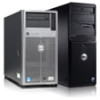Dell PowerEdge T320 Owner's Manual - Page 27
System Setup Main Screen, System BIOS Screen, System Information Screen, System Model Name - tpm
 |
View all Dell PowerEdge T320 manuals
Add to My Manuals
Save this manual to your list of manuals |
Page 27 highlights
System Setup Main Screen NOTE: Press to reset the BIOS or UEFI settings to their default settings. Menu Item System BIOS iDRAC Settings Device Settings Description This option is used to view and configure BIOS settings. This option is used to view and configure iDRAC settings. This option is used to view and configure device settings. System BIOS Screen NOTE: The options for System Setup change based on the system configuration. NOTE: System Setup defaults are listed under their respective options in the following sections, where applicable. Menu Item Description System Information Displays information about the system such as the system model name, BIOS version, Service Tag, and so on. Memory Settings Displays information and options related to installed memory. Processor Settings Displays information and options related to the processor such as speed, cache size, and so on. SATA Settings Displays options to enable or disable the integrated SATA controller and ports. Boot Settings Displays options to specify the boot mode (BIOS or UEFI). Enables you to modify UEFI and BIOS boot settings. Integrated Devices Displays options to enable or disable integrated device controllers and ports, and to specify related features and options. Serial Communication Displays options to enable or disable the serial ports and specify related features and options. System Profile Settings Displays options to change the processor power management settings, memory frequency, and so on. System Security Displays options to configure the system security settings like, system password, setup password, TPM security, and so on. It also enables or disables support for local BIOS update, the power and NMI buttons on the system. Miscellaneous Settings Displays options to change the system date, time, and so on. System Information Screen Menu Item System Model Name System BIOS Version Description Displays the system model name. Displays the BIOS version installed on the system. 27















